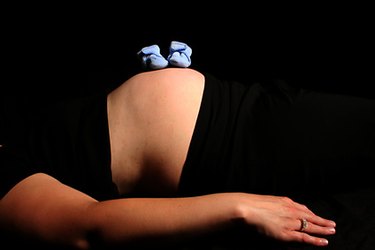
Approach weight loss after breast-feeding the same way you would have approached it prior to becoming pregnant, advises Dr. Abaz Sosic, a gynecologist and obstetrician in Bradford, Pennsylvania. Most women naturally lose weight throughout the breastfeeding process. However, some women either do not lose enough weight, fail to lose any weight or gain weight while breastfeeding. Make sure you actually need to lose weight before embarking on a weight loss program.
Determine Need
Video of the Day
Do not compare your size to the size of Hollywood celebrities, who are often to thin, advises Dr. Micheal Hall, a family practitioner in St. Marys, Pennsylvania. Your doctor can calculate your body mass index and factor in other weight characteristics to help you determine if you need to lose extra weight. It often takes nine to 18 months before your body recovers fully from pregnancy, labor and delivery. If you have not breastfed for this length of time, your body may still be trying to recover and simply has not returned to its normal shape yet. For others, pregnancy can cause permanent body changes like wider hips, softer belly or larger waistline.
Video of the Day
Weight Loss
Healthy weight loss consists of losing no more than two pounds a week, according to the website FamilyDoctor.org. To achieve this type of weight loss, consume fewer calories or burn extra calories through exercise until you create a 3,500 to 7,000 calorie deficit between the calories you eat and the calories your body uses each week. You will need to consume about 500 fewer calories now than you did when you were breastfeeding. Most women need between 1600 and 2400 calories each day depending on age and activity level, according to the United States Department of Agriculture.
Fad Diets
Try to avoid using fad diets advise Sosic and Hall. Not only can these diets result in nutrient deficiencies, they can cause you to lose lean muscle mass. When you lose lean muscle mass, you decrease your body's ability to burn calories during the day, increasing your chances of rapid weight gain after your weight loss. Plus, if your body has not fully recovered from labor and delivery, a fad diet can delay your recovery process.
Healthy Eating
You can quickly reduce your calorie intake by making small changes to the way you eat. Focus on consuming at least five servings of fruits and vegetables each day. Not only will this change cut calories, it will increase your fiber and nutrient intake to keep you fuller longer, according to Help Guide. Increase your water intake by replacing high calorie drinks, such as soda, juice, alcohol or coffee. If you eat more protein and whole grains, you will also feel fuller longer. Eat regular meals to help control your portion sizes and to avoid overeating. You should have been following a similar diet while breast-feeding. If so, try to reduce your calories by eliminating extra calories from fat and sugars.
Physical Activity
The more physically activity you get each day, the more calories you burn. Simply taking the stairs, parking farther away from your destination or walking around while you talk on the phone will increase your calorie use. To get heart healthy benefits from physical activity and have faster weight loss results, the American College of Sports Medicine recommends exercising at a moderate intensity for 30 minutes on most days of the week and performing eight to 10 strength training exercises at least twice a week. If you have not breastfed for at least three months, consult your obstetrician to determine the safety of exercise, advises Sosic.